Sustaining SBC Efforts in Malaria Control Through Nigeria’s Ward Development Committees
With an estimated 68 million cases and 194,000 deaths due to the disease in 2021, Nigeria has the highest burden of malaria globally, accounting for nearly 27% of the global malaria burden.[1] Pregnant women and children under the age of five are especially susceptible to contracting this deadly disease. Frequent antenatal care (ANC) visits, and the provision of nets and malaria preventive treatment which occur during these visits, protect the health of pregnant women and their unborn children. Similarly, taking all children with fever a health facility on the same or next day is a life-saving action; it ensures they are tested for malaria and receive prompt, appropriate medication.
However, sick and pregnant clients, especially in rural areas, face formidable challenges with accessing malaria prevention and treatment services due to various reasons. These include challenging terrains, seasonal hindrances such as flooding, distrust or discontentment with health facilities, fatalism, a preference for self-medication or use of traditional birth attendants, and the high cost of transport services to health facilities. These barriers to prompt, necessary, and quality care can be life-threatening. They can be overcome through the involvement of the community component of Nigeria’s health system: the Ward Development Committees (WDC).
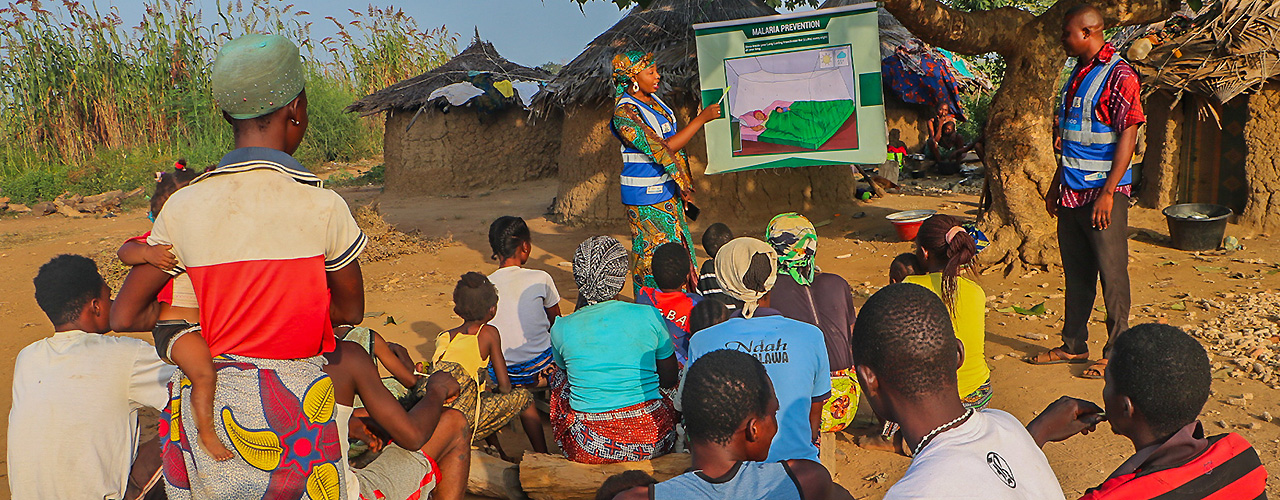
A WDC member and a community volunteer “tag team” to give a presentation at a compound meeting. Credit: Kannah Ibrahim, Breakthrough ACTION-Nigeria
WDCs, an initiative of Nigeria’s National Primary Health Care Development Agency, consist of respected local community members organizing and managing the health and development activities in Nigerian municipalities called wards. They play a crucial role in fostering community participation and improving access to primary health care services at the ward level. Trusted by community members, WDCs ensure community ownership of primary health activities, such as health promotion and community mobilization, maternal and newborn child health services, nutrition, control of communicable and non-communicable diseases and sexual and reproductive health, and community development activities. However, such activities necessitate proper training and adequate resources; without them, the WDC members’ potential contributions can be limited.
Since 2022, the U.S. President’s Malaria Initiative (PMI)-funded social and behavior change project Breakthrough ACTION has worked in Nigeria to collaborate to expand communities’ ability to address barriers to accessing malaria services WDCs in 219 wards in seven states (Akwa Ibom, Benue, Cross River, Nasarawa, Oyo, Plateau, and Zamfara).
“There was no functional WDC structure in my ward, and I know it was the same across many wards in my local government area. Breakthrough ACTION’s engagement gave us a good platform to start engaging the community.”
— Ekwere Ekwere, WDC Chairman, Ebighi Okpono 6, Esit Eket Local Government Area, Akwa Ibom State
The project trained the WDC members to conduct community outreach, using approaches such as compound meetings, community health dialogues, and even household visits. The committee members engaged their families, peers, and networks with malaria prevention and treatment messages; provided referrals for fever care and ANC services; and followed up with the people they referred. These approaches addressed some of the barriers to using or accessing malaria services. They also received training to mobilize resources for community health to ensure sustainability of their activities.
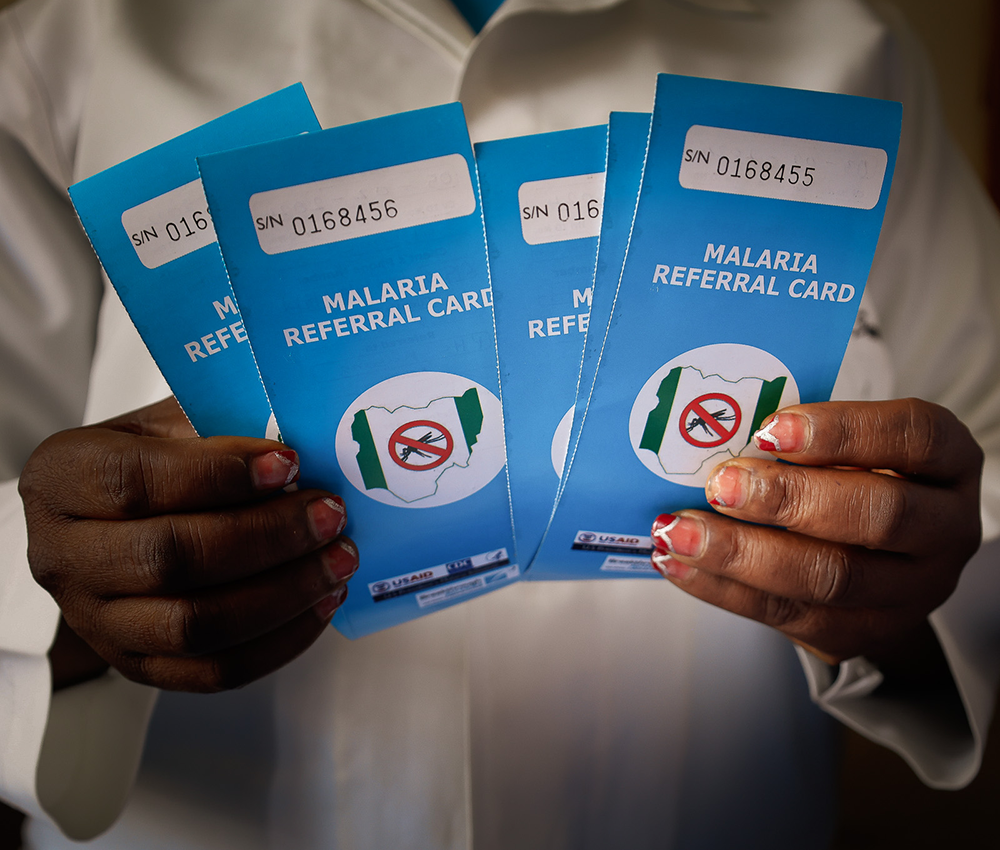
A community leader holds several of Breakthrough ACTION’s malaria referral cards. Credit: Edoziem Valentine, Breakthrough ACTION
While they implemented the community activities, the WDC members received technical and logistical support from Breakthrough ACTION-Nigeria and the State Malaria Elimination Programme Officers. Breakthrough ACTION and the government partners provided continuous coaching and mentoring to the WDCs in the delivery of the messages and activities through monthly review meetings.
Between October 2022 and February 2024, 217 WDCs conducted 10,148 community activities and reached 187,706 participants. Of these, 41,922 community members received referrals to health facilities for fever care and ANC services. WDCs were highly effective at ensuring their clients followed through on referrals. Their overall referral completion rate was 88% for fever and 86% for ANC.
As the country moves towards sustainable SBC interventions for malaria, the results suggest that WDCs—a communal resource group—can be change agents in increasing community members’ knowledge, increasing health facility utilization and are highly influential among both males and females. Future initiatives should measure WDCs’ influence on community perceptions and other malaria behaviors and explore ways to cost-effectively scale the use and reach of WDCs for malaria social and behavior change.
Access the tools and resources the WDCs used and learn more about other malaria SBC approaches implemented by Breakthrough ACTION in Nigeria.
References
[1] World Health Organization African Region. (2023). Report on malaria in Nigeria 2022. https://www.afro.who.int/countries/nigeria/publication/report-malaria-nigeria-2022
Written By:
Edoziem Valentine, Program Officer II, Knowledge Management; Edet Ekpo, Program Officer, Malaria; Olusola Adeoye, Senior Program Officer II, Malaria and Tuberculosis

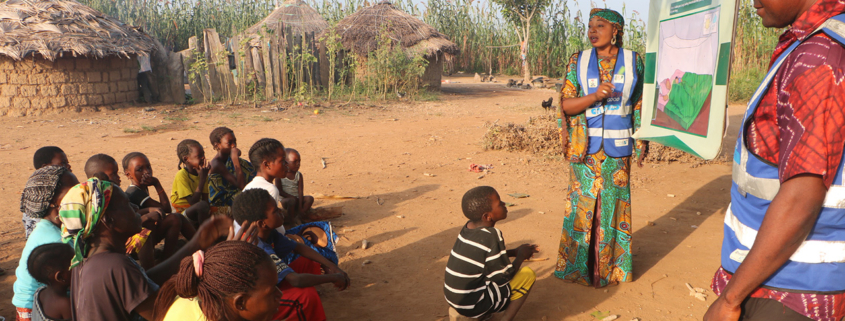 2024 Johns Hopkins University
2024 Johns Hopkins University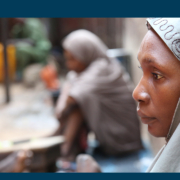
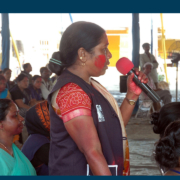 Gopal Bhattacharjee/Photoshare
Gopal Bhattacharjee/Photoshare Kuntal Kumar Roy/Photoshare
Kuntal Kumar Roy/Photoshare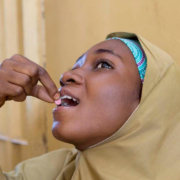 WHO
WHO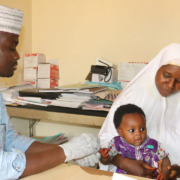 Breakthrough ACTION
Breakthrough ACTION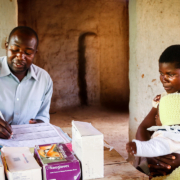 Photo credit: amy Rakotoniaina/PMI/Flickr
Photo credit: amy Rakotoniaina/PMI/Flickr